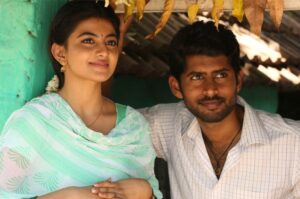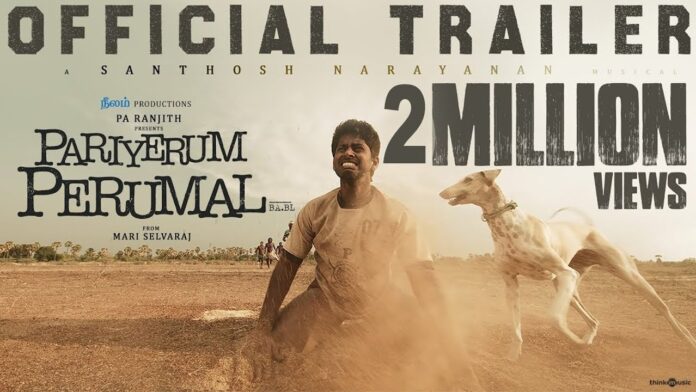Pariyerum Perumal (also called Pariyan) is a story of a young Dalit man who wants to become a lawyer, like Dr. B.R. Ambedkar. The story revolves around him and the humiliation he faces at the hands of upper-caste Hindus as he struggles through college and life. This movie journeys through what happens to Dalits who aspire to break out of the shackles of caste and rise above. The humiliation that Pariyan faces is symptomatic of the caste system.
Periyan towards the end of the movie says “he does not know whether he loves Jo because before he could understand his feelings he was beaten up.”
Humiliation: A tool for Oppression
The story starts with Pariyan’s best friend, his dog, Karupi, being killed by upper-caste men. These men kill Karupi as a punishment against Pariyan and his friends for hunting. Pariyan is heartbroken. He goes to college to study law, where he meets Jo. Jo is a dominant caste woman who falls in love with Pariyan. The rest of the story follows Pariyan and the humiliation he faces at the hands of Jo’s family.
The film focuses on how public humiliation is used as a tool to exert caste power. The public humiliation grows stronger as we go down the caste system. Upper caste Hindu Brahmins do not face public humiliation, their bodies are not sites of caste humiliation. Dalit bodies and Dalit lives become thus, bodies are sites where caste is being constantly reinforced. Public humiliation is the tool that is used by dominant caste Savarnas to suppress any resistance and revolt against the caste system. The humiliation serves as an example for others to follow their caste and to oppress anyone, specifically Dalits, from breaking the boundaries of the system.
Also Read: Court, a commentary on legalised Caste Oppression
Dalit persons have been at the receiving end of this humiliation. Women being sexually abused, men being publically flogged, and massacres of Dalits. These are means by which Savarnas exert socio-economic and political power over Dalits.
The case in the movie is not very different. Upper-caste men violently attack Dalits, the protagonist faces humiliation in college for being Dalit, being killed for being in love with upper-caste women.
The movie is not only about humiliation. It is about Periyan’s continued resistance which he has to engage in on a daily basis. A resistance that breaks him but forces him to keep moving forward. A reminder of the burden of resistance that Savarnas have thrown on the shoulders of lower caste peoples. The movie pushes one to face not only the violence that we commit against Dalits but also the forced struggle that we expect them to engage in and still come out at the top. While this happens for Pariyan, in the film, it is not a reality for many other Dalit people.
Degrees of humiliation
Humiliation is the unbearable knowledge of power and violence of the public which then resides as shame in the body of the individual. Public humiliation that Savarna elites engage in shows the power they command over public spaces. In one scene, Periyan gets his father to college. His father is an artist who dresses up as a female dancer to perform at village festivals. Jo’s brother and his friends recognize him as Periyan’s father. They publicly harass him and try to undress him. Periyan’s father runs away begging them to stop. As the audience watches on and some also engage in this humiliation, Periyan is the only one who tries to rescue his father. The public continues to be an active partner. This scene is also important because it intersects the effeminate nature of a Dalit man with Savarna toxic masculinity. The act was a two-fold attack. One on the caste of Periyan’s father and the other on his sexuality.
University Spaces and love
 The movie focuses on various instances of honour killings that take place in Tamil Nadu. This sets the backdrop for Periyan’s impending humiliation by Jo’s family. Periyan towards the end of the movie says “he does not know whether he loves Jo because before he could understand his feelings he was beaten up.” The humiliation that Periyan faced was not because of his feelings towards Jo, but because of the threat that he posed to the honour of Jo’s family.
The movie focuses on various instances of honour killings that take place in Tamil Nadu. This sets the backdrop for Periyan’s impending humiliation by Jo’s family. Periyan towards the end of the movie says “he does not know whether he loves Jo because before he could understand his feelings he was beaten up.” The humiliation that Periyan faced was not because of his feelings towards Jo, but because of the threat that he posed to the honour of Jo’s family.
The portrayal of the university space in the movie is similar to the violent university spaces that are spread across the country. These spaces have been centers of violence against Dalit students, many of whom have been killed by suicide due to the discrimination they face. In Periyan’s case and the case of Indian colleges, merit alone determines the legitimacy of a student. Anyone else is seen as a violator and not deserving of the place they take in University. Almost always, the denying of the right to be in the space is aimed at Dalits. The exercise of discrimination is the process to push them to the margins of this space.
Reparations and Annihilation
The movie also pacifies the Savarna gaze. Jo’s father is shown to be a man with morals. While being casteist, he also advocates for ‘lesser forms of humiliation’ and ‘lesser casteism’ against Periyan. Thus seems like a man forced to follow societal norms. Towards the end of the movie, he comes to apologize to Periyan, and Periyan is expected to forgive him. This is a respite to the guilty hearts of Savarna liberals. The weight of the violence that they mount on Dalits seems to have a solution, an apology. An apology for centuries of casteism is not only impossible, but it is also inherently casteist. The burden of accepting an apology should not and must not fall on the shoulders of Dalits, the burden of undoing this casteism is not for Dalits to shoulder. Reparations for the violence and the socio-economic and political disenfranchisement that have been and continue to be done is one of the only solutions against the caste order.
Periyan continues to fight against the caste order throughout the film. He fights to be a voice for his community and struggles to live. It is a struggle that he should not have to engage in, a burden (of carrying on) that he should not have to bear. Caste is that part of us that refuses to shed its ugly skin. In fact, we clutch on to it and ensure others clutch on to it too. In India, caste atrocities are not in the dark underbelly but lie out on the open like a festering wound. Those who do not believe in the existence of it, are those who more often than not perpetuate the violence. There is no running away from caste, there can only be the annihilation of Caste.
Views are personal.



